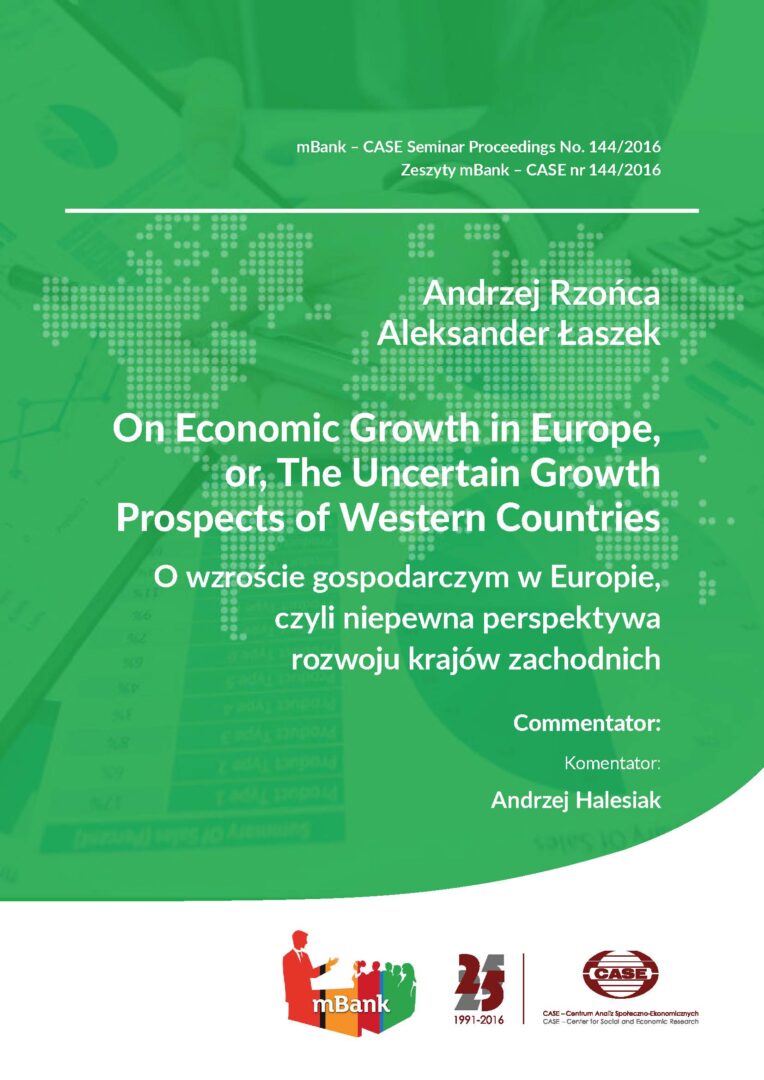 Homepage CASE
Homepage CASE
Selected values

144th mBank-CASE Seminar Proceedings: On Economic Growth in Europe, or, The Uncertain Growth Prospects of Western Countries
-
ALEKSANDER ŁASZEK
Articles from this author:
-
146th mBank-CASE Seminar Proceedings: Economic policy, the international environment and the state of Poland’s public finances: Scenarios
Poland’s structural deficit is one of the largest in the EU. While other Member States are taking action to reduce their deficits, the Polish government has not only introduced costly projects, but has also announced additional projects that will further aggravate the state of Polish public finances. The aim of maintaining the nominal deficit under … Continued
-
146th mBank-CASE Seminar Proceedings: Economic policy, the international environment and the state of Poland’s public finances: Scenarios
-
ANDRZEJ HALESIAK
-

Andrzej Rzońca
Professor at the Warsaw School of Economics, with a postdoctoral degree in the economic sciences, Andrzej Rzońca is also a member of supervisory boards of commercial law companies. His positions held to date have included president of the board of the Association of Polish Economists, member of the Monetary Policy Council (third term), chief economist … <a href="https://case.dev10.pro/publications/144th-mbank-case-seminar-proceedings-on-economic-growth-in-europe-or-the-uncertain-growth-prospects-of-western-countries/">Continued</a>
Articles from this author:
-
131st mBank-CASE Seminar Proceedings: The effects of unconventional monetary policy: what do central banks not include in their models?131st mBank-CASE Seminar Proceedings:
In 2009, for the first time since the end of World War II, the world economy shrank. This resulted from the economic downturn in highly developed countries and surprised most economists. According to the IMF forecast published in spring 2008, GDP growth in these countries was expected to accelerate from 1.3% in 2008 to 3.8%. … Continued
-
131st mBank-CASE Seminar Proceedings: The effects of unconventional monetary policy: what do central banks not include in their models?131st mBank-CASE Seminar Proceedings:
Growth in the European Union since the outbreak of the global financial crisis is slower (1) than before the crisis, (2) than the trend would indicate, (3) than forecast and (4) than in the United States. The factors driving its weakness lie more on the supply side than the demand side. The loss of potential output after the crisis was exacerbated by inequalities from before the crisis; fiscal stimulus from 2007-2009, increasing public expenditure despite the lack of fiscal space; excessive liquidity support for banks; and inflexibility of the market for goods at the moment the crisis broke out. The problems with growth may deepen and become permanent if social support for anti-market parties continues to grow. Extremist parties are supported by divergence among the countries of the “old” EU and the slowdown of convergence in the new member states, as well as tendencies related to inequality, in particular the reduction of households’ mobility between income groups.
Related publications
Thanks for joining us!
You're now part of a community that values [your newsletter's focus]. Get ready to stay informed, inspired, and engaged with our carefully curated content.
